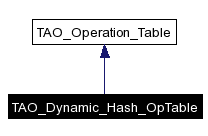
#include <Operation_Table_Dynamic_Hash.h>
Inheritance diagram for TAO_Dynamic_Hash_OpTable:


Public Member Functions | |
| TAO_Dynamic_Hash_OpTable (const TAO_operation_db_entry *db, CORBA::ULong dbsize, CORBA::ULong hashtblsize, ACE_Allocator *alloc) | |
| ~TAO_Dynamic_Hash_OpTable (void) | |
| Destructor. | |
| virtual int | bind (const char *opname, const TAO::Operation_Skeletons skel_ptr) |
| See the documentation in the base class for details. | |
| virtual int | find (const char *opname, TAO_Skeleton &skelfunc, const unsigned int length=0) |
| virtual int | find (const char *opname, TAO_Collocated_Skeleton &skelfunc, TAO::Collocation_Strategy s, const unsigned int length=0) |
Private Types | |
| typedef ACE_Hash_Map_Manager_Ex< const char *, TAO::Operation_Skeletons, ACE_Hash< const char * >, ACE_Equal_To< const char * >, ACE_Null_Mutex > | OP_MAP_MANAGER |
Private Attributes | |
| OP_MAP_MANAGER | hash_ |
| The hash table data structure. | |
|
|
|
|
||||||||||||||||||||
|
Initialize the dynamic hash operation table with a database of operation names. The hash table size may be different from the size of the database. Hence we use the third argument to specify the size of the internal hash table. The <alloc> argument is used to determine where the memory comes from (usually from <ace_static_allocator_base>). |
|
|
Destructor.
|
|
||||||||||||
|
See the documentation in the base class for details.
Implements TAO_Operation_Table. |
|
||||||||||||||||||||
|
Uses opname to look up the collocated skeleton function and pass it back in skelfunc. Returns non-negative integer on success, or -1 on failure. Implements TAO_Operation_Table. |
|
||||||||||||||||
|
Uses opname to look up the skeleton function and pass it back in skelfunc. Returns non-negative integer on success, or -1 on failure. Implements TAO_Operation_Table. |
|
|
The hash table data structure.
|
 1.3.9.1
1.3.9.1